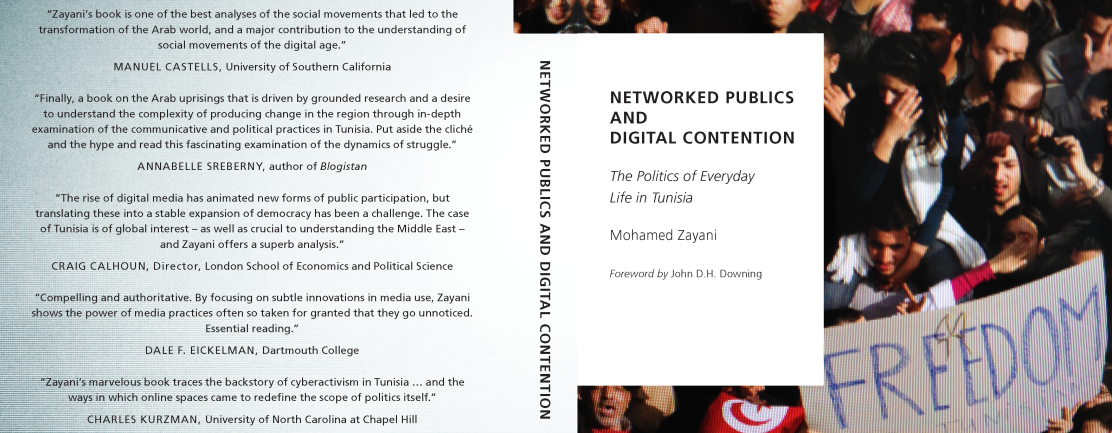CCT's Prof. Mohamed Zayani publishes new book on cyber activism in the Middle East

The co-evolution of technology and society in the fast changing Middle East and North Africa region is the focus of a new book titled Networked Publics and Digital Contention: The Politics of Everyday Life in Tunisia, written by Mohamed Zayani, Georgetown Professor and Faculty with the Georgetown Communication, Culture and Technology Graduate Program. The book is published by Oxford University Press in collaboration with the Georgetown Center for International and Regional Studies (CIRS).
 Drawing on extensive fieldwork and in-depth interviews with cyber activists, bloggers, and ordinary internet users, the author explores how and to what extent the wide adoption of the internet has affected Arab publics, in particular the youth. The book offers a fresh perspective on social movements in the context of changing communication practices and new digital technologies. Taking Tunisia as a case study, it draws attention away from the tools of political communication and refocuses it on the politics of communication.
Drawing on extensive fieldwork and in-depth interviews with cyber activists, bloggers, and ordinary internet users, the author explores how and to what extent the wide adoption of the internet has affected Arab publics, in particular the youth. The book offers a fresh perspective on social movements in the context of changing communication practices and new digital technologies. Taking Tunisia as a case study, it draws attention away from the tools of political communication and refocuses it on the politics of communication.
“We know a great deal about how the Internet is being consumed in the West but there is little in-depth research about emerging forms of online communication in the Global South, which includes the Middle East,” said the author, who directs the Media and Politics Program—a joint initiative with Northwestern University (NUQ). He is also the co-director of the CCT Institute on Media, Technology & Digital Culture in the Middle East.
“The Middle East is marked by an unprecedented youth bulge and growing access to various forms of information and communication technologies. The book whisks us away from familiar accounts of the internet as a tool for activism to examine evolving social, cultural and political dynamics associated with new communication practices: what is it that the youth are doing on the Internet? What forms of engagement are they involved in? What kind of dynamics are developing on the margins of society and how are they reconfiguring the state-society relationship?” Zayani asks.
Manuel Castells, Wallis Annenberg Chair of Communication Technology and Society, University of Southern California, described Zayani’s book as “one of the best analyses of the social movements that led to the transformation of the Arab world, and a major contribution to the understanding of social movements of the digital age.”
Commenting on the broader significance of the book, Craig Calhoun, the President of the London School of Economics and Political Science noted: “The case of Tunisia is of global interest, as well as crucial to understanding the Middle East, and Zayani’s Networked Publics and Digital Contention offers a superb analysis.”
The book is part of the Oxford Series in Digital Politics, which brings together scholars with an interest in understanding the information and communication environments involving politics and policy-making. Mohamed Zayani’s previous works include The Al Jazeera Phenomenon: Critical Perspectives on New Arab Media and The Culture of Al Jazeera: Inside an Arab Media Giant.
[]
- Tagged
- news